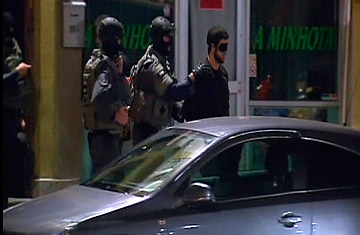
Masked police escort a man from a house in Antwerp, Belgium. Germany and the Netherlands arrested at least 10 people on suspicion of planning an Islamist militant attack in Belgium
It's one of Berlin's top tourist attractions — the Reichstag building, home to the Bundestag, Germany's lower house of Parliament. But an eerie calm has descended on this key landmark ever since police closed the famous glass dome and roof terrace to visitors on Monday amid mounting fears of a terrorist attack. That same afternoon, a group of bewildered visitors walked up to the security barriers that now encircle the building and asked a police officer brandishing an automatic weapon if they could go in. "It's shut," grunted the officer. All around the country, there are signs of increased security and heightened caution, as Germany tries to protect itself against an attack it's sure is coming.
On Nov. 17, Interior Minister Thomas de Maizière raised the country's terrorism threat level, saying the authorities had "concrete information" about an attack at the end of the month. Since then, there's been intense speculation in the German media about possible targets. According to a Nov. 20 article in the magazine Der Spiegel, Islamic extremists are planning to attack the Reichstag in a "Mumbai-style" raid. The magazine cited intelligence reports claiming that a jihadist who wanted to defect had told the German authorities that a six-man terrorism commando was preparing to stage a deadly assault.
The terrorism alert has prompted an unprecedented security operation and a flurry of bomb alerts — all false alarms so far. Heavily armed police officers have been sent to government offices, airports and railway stations, and police leaves have been canceled until the end of the year. Even at the traditional Christmas markets, which opened in Berlin on Monday, security measures have been tightened. At the picturesque market in Gendarmenmarkt, in Berlin's Mitte district, there was a steady stream of visitors on Monday evening, but the crowds stayed away. As people queued up to get a glass of mulled wine, with the sounds of "Do They Know It's Christmas?" blaring from a loudspeaker, three burly security guards lurked in a corner. "I thought twice about coming here, but I feel safe," says Robert, a hairdresser.
Whether as a show of stoic defiance or a sign of blasé indifference, many Germans are not letting the terrorism threats affect their everyday lives. A survey published by the mass-market daily Bild on Nov. 22 found that 75% of Germans said they were "not afraid" and weren't intending to change their plans. "When they issued the terror alert, I thought, Oh my god, it's reached us," says Ivonne, a student. But, she adds, "I won't stop going to crowded places."
For weeks, German intelligence officials have been deluged with reports from a number of sources that al-Qaeda-linked Islamic militants may be heading to Germany to carry out an attack. "We're taking the terror threat seriously," Interior Minister de Maizière told the public-television channel ARD on Sunday night, dismissing reports of specific targets as "irresponsible speculation." While the government used to talk down the terrorism risk, last week's decision to raise the threat level marks a significant U-turn. Since then, security officials have been working overtime to stop the rumor mill. "We have concrete details about suspects," Jörg Ziercke, head of Germany's Federal Criminal Police Office, the BKA, told reporters on Nov. 20. "There is no concrete information that a terror attack will be planned at a certain time or place," he added cagily.
Law-enforcement agencies say there are up to 130 Islamic militants of German origin who are bent on violence. One suspect is a Berlin man, identified as 23-year-old Hayrettin Burhan Sauerland — who is believed to be in hiding in the Pakistan-Afghanistan border region, with an international arrest warrant out on him. Law-enforcement agencies have successfully foiled several al- Qaeda-inspired terrorism plots in the past, including the so-called Sauerland terror cell, whose members were arrested in September 2007. But Germany's continuing military presence in Afghanistan, where it has up to 5,000 troops, makes it a prime target for al-Qaeda.
As the German authorities step up security, questions have been raised as to whether they are up to the job. There are growing calls for the army to help with the counterterrorism operation, and police union officials complain that officers are ill-equipped to handle the threat given that thousands of jobs have been cut over the past few years. "The new security crackdown is a burden," says Rainer Wendt, head of Germany's police union.
Some observers say the intelligence services, too, are having trouble keeping up with the threat. "The Berlin authorities are struggling to identify and keep track of young radicalized Muslims," Guido Steinberg, a terrorism expert at the German Institute for International and Security Affairs, tells TIME. Citing information from the security services, Steinberg points to the example of a group of suspected jihadists who had been under surveillance by the German authorities and still managed to slip away, leaving Berlin for Pakistan in August. "It's a scandal, especially as al-Qaeda-linked groups in Pakistan are always on the lookout for German recruits," he says. As tip-offs about a possible attack continue to flow in, Germany's law-enforcement agencies face a long, tough winter.
